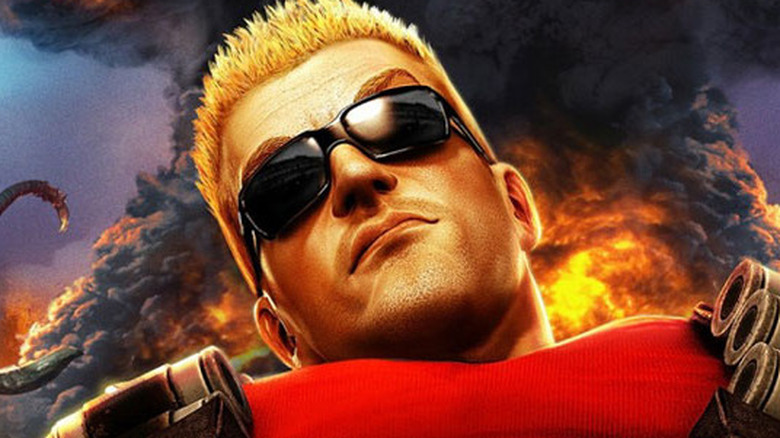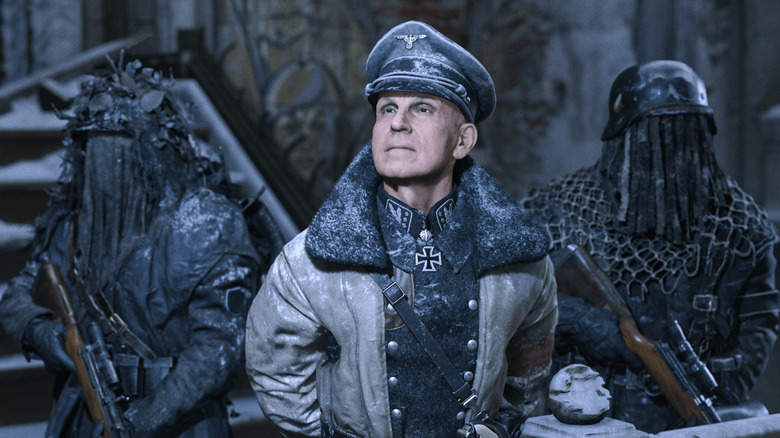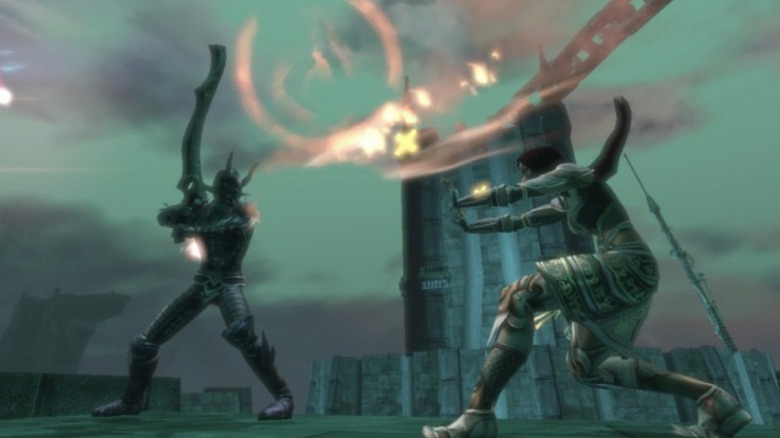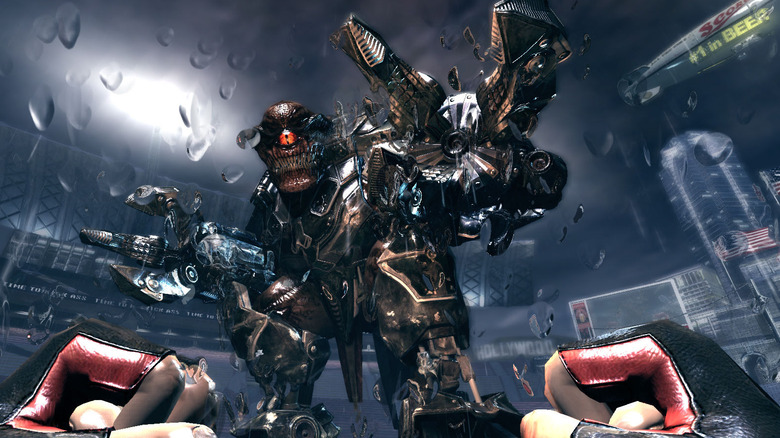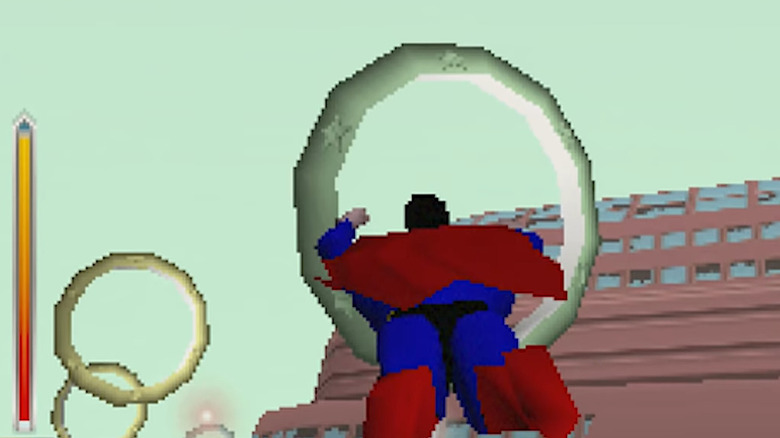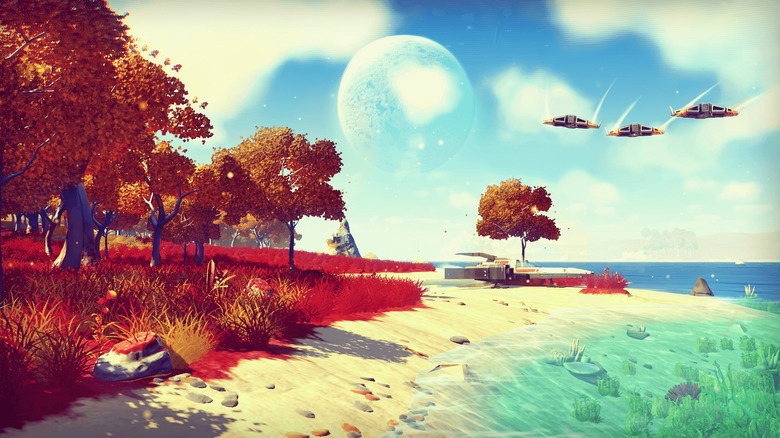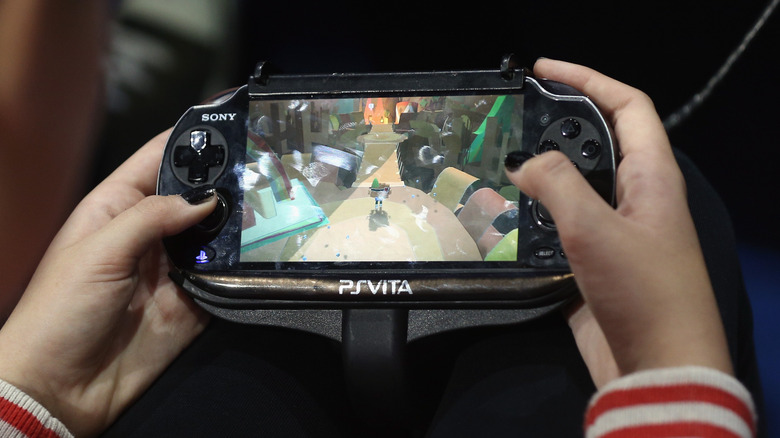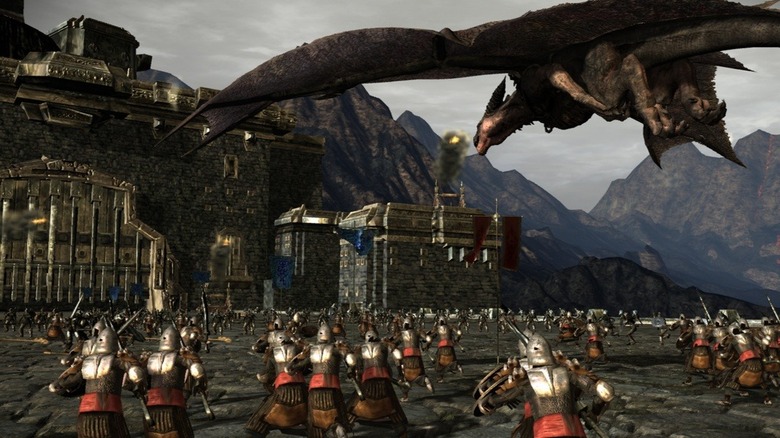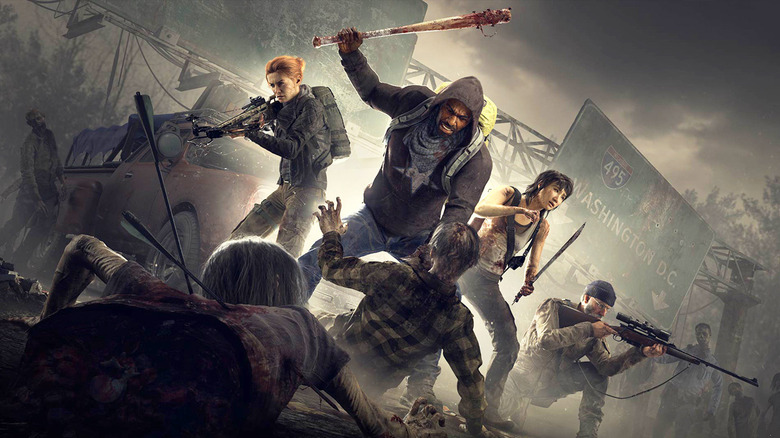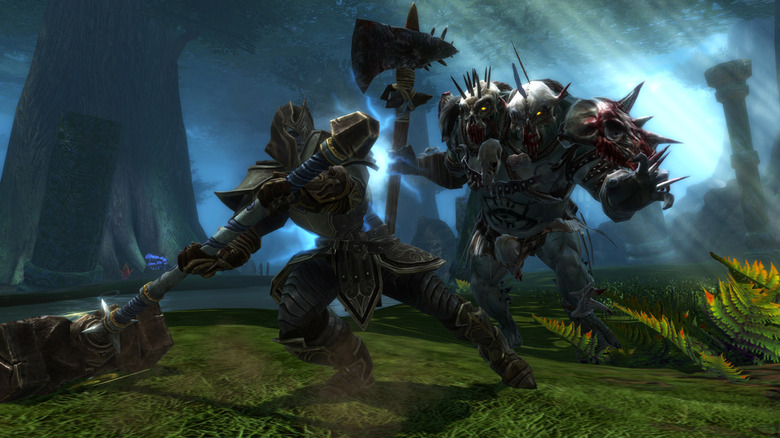The Worst Excuses Companies Gave For Gaming Flops
Video games are an exceptionally challenging medium of entertainment to produce. As noted by Bloomberg, game studios are some of the riskiest investments, because any number of factors can go wrong in development.
Maybe a studio's flagship title is released to stiff competition in a saturated field, or perhaps the development of a game takes longer than expected and needs to update its engine halfway through. Sometimes even the most well-researched and well-produced games will simply fail to connect with their target audience. While the size and scope of each game differs, these risks remain constant and only scale up further with grander ambitions. Some games, for whatever reason, flop pretty hard.
High expectations for an unreleased game can be both a blessing and a curse. Of course, developers and publishers typically want as much attention as possible, but when games fail to live up to elevated preconceptions, a studio has three choices: ignore the criticism, accept the notes and use them proactively, or reject the critiques and give excuses for their shortcomings. What follows is a breakdown of some of the most embarrassing and out-of-left-field explanations for gaming's most memorable flops.
Call of Duty: Vanguard - World War 2 didn't connect
2021 was not kind to Activision Blizzard. Caught amongst internal scandals, falling profits, decreased popularity of its games, lay-offs, and more, Activision Blizzard could not catch a break. At this point, many fans hope its acquisition by Microsoft can turn the tide for the once-lauded gaming studio.
"Call of Duty: Vanguard," released in 2021, brought longtime fans back to the classic "Call of Duty" experience and functioned as a companion to the wildly popular battle royale, "Call of Duty: Warzone." Unfortunately, the FPS struggled against even other "CoD" titles. Critics took issue with its short and convoluted campaign, its clogged content pipeline, as well as other shortcomings that drowned out sales (per Kotaku).
Activision Blizzard, in its 2021 Annual Report for investors, lamented the game's lower sales and attempted to figure out where it went wrong. The reason for such disappointing sales numbers was, (apparently) because, "the setting didn't resonate with some of our community." According to Activision Blizzard, it's not every other red flag about the game itself that turned people away, just that the most historicized and remembered war of contemporary history wasn't popular enough with people.
LawBreakers - Too Woke?
Known for his design work on the "Gears of War" franchise, Cliff Bleszinski went on to create Boss Key Studios. Founded in 2014, the studio adopted the mission of creating a hero-shooter called "LawBreakers."
The development and vision of "LawBreakers" was spearheaded by Bleszinski, and he would have rough times ahead. "LawBreakers" failed to reach more than a few thousand concurrent players upon release in 2017. Its current Metacritic score shows the game itself wasn't exactly terrible, but it failed to catch on with players.
"Overwatch" and its ilk beat "LawBreakers" to the punch, bringing hero shooter mechanics mainstream audiences a year earlier in 2016. However, the eccentric leader of Boss Key Studios — known to many as CliffyB — thought "LawBreakers" failed for another reason.
In a post-mortem Instagram post, Cliff claimed that "LawBreakers' may have failed because, "I pushed my own personal political beliefs in a world that was increasingly divided." Bleszinski expressed his belief that the marketing may have led to some critics writing "LawBreakers" off as a so-called "woke" game. Of course, it's worth remembering that "Overwatch," the giant that forced "LawBreakers" out of the ring, was a major success while promoting its own ideals of diversity (per Game Rant). Of course, Bleszinski also conceded that several other factors — including timing and platform exclusivity — also had a negative impact on the game.
Tony Hawk: RIDE - Skateboard controllers are hard to produce
Since the late-90s, the "Tony Hawk" franchise has been an industry leader in the skateboard genre. "Tony Hawk's Pro Skater 2" is one of the few near-perfect games according to Metacritic. Gamers are so nostalgic about "Tony Hawk's Pro Skater" that 202o's remastered bundle of "Tony Hawk's Pro Skater 1+2" became the fastest title in the franchise to sell over 1 million copies.
However, while the "Tony Hawk's Pro Skater" line of the franchise is well-remembered for its innovations, "Tony Hawk: Ride" was not so handsomely rewarded for its boldness. At the time of its development, unorthodox console controllers were all the rage: The Wii had a motion controller, "Guitar Hero" and "Rock Band" used all types of instruments as controllers, etc.
In the case of "Tony Hawk: Ride," its claim to fame was its rideable skateboard controller. In order to pull off tricks in the game, players used their feet and weight to make inputs. Sadly, the skateboard controller never gained traction, as critics pointed towards its clunky and unoptimized nature within the game — not to mention its high $120 price point (as per IGN).
In a subsequent earnings report, Activision blamed the poor performance of the game on the fact that, "in hindsight, it took longer to optimize the hardware leaving less time to develop the software we launched in 2009" (via TechRadar). Turns out that designing an unnecessary and expensive peripheral for a single game (at the expense of that game's development) wasn't a good idea.
Fury - Gamers hate losing
The year is 2007 and the MMORPG genre is absolutely booming. "World of Warcraft" is breaking records with its first expansion, "World of Warcraft: The Burning Crusade," while giants like "RuneScape" cultivated a long-term player base. Game developers were into the idea of producing a "WoW killer" a new MMORPG that would take the crown of the growing genre.
And so, Australian game developer Auran (now N3V Games) set out to make "Fury," a PvP-focused MMORPG. "Fury" set itself apart by focusing on PVP combat, but its release was met with negative reviews and the game never received an especially active player base (per MassivelyOP).
In an interview with GameSpot Australia, Auran CEO Tony Hilliam said, "Players hate losing, and ultimately Fury didn't have 200 hours of safe haven PvE environments where players could become comfortable with their character. The result was they came and they got beaten up, without really knowing why, and blamed the game for this (which is easier than blaming their lack of experience)."
While this explanation isn't too far out of the realm of possibilities, it does discount the fact that if fighting, learning, and losing in Fury was fun, then it probably wouldn't have flopped. And losing as a core game experience can be fun, as demonstrated by successful Roguelites and Souls-like games. At the end of the day, critics came down on the title for being unfairly punishing at times.
Duke Nukem Forever - Reviewers are unfair
"Duke Nukem 3D," released in 1996 by 3D Realms, is one of the most influential FPS shooters in the history of video games. Campier and more over-the-top than "Doom," Duke's brand of slaughter allowed fans to let out their pent-up aggression through exaggerated machismo and goofy one-liners.
The much anticipated sequel, "Duke Nukem Forever," wouldn't be released until 15 years later – to absolutely horrible reviews. Many critics blasted "Duke Nukem Forever" for failing to meet its outsized expectations and for somehow turning Duke Nukem into a boring character (per GameSpot).
In response to the poor reception of their game, Gearbox's co-founder Brian Martel argued to Eurogamer that honest reviews of "Duke Nukem Forever" were sacrificed in favor of "a soapbox," upon which critics spouted their own ideology. He went on to further criticize the negative reviews, saying that they were unfair and that the title was misunderstood.
A lost early build of the game from 2001 surfaced in 2022, resulting in the two ex-heads of 3D Realms pointing fingers at each other over the game's muddled production (as per PC Gamer). Even after all these years, the blame for this blunder is still being shifted.
Superman 64 - Kryptonite Fog
Based on "Superman: The Animated Series," "Superman 64" was an action-adventure game developed and produced for the Nintendo 64 by Titus Interactive. Released in 1999, "Superman 64" is often considered one of the worst games of all time due to its awkward controls, confusing objectives, and horrific visuals.
Even for its time, Superman 64 was exceptionally low-detail, which caused some characters to look like awkward and poorly-animated. However, the worst visual component of the game was its draw distance, which refers to how far from the player's point-of-view objects can appear. The draw distance in "Superman 64" was seemingly sacrificed in favor of other elements, making a flight through Metropolis a dangerous affair where skyscrapers can pop out of nothingness right in front of Superman. In an iconic choice, everything was enveloped in a sea of green fog.
To cover up this issue, the developers of "Superman 64" claimed that the lack of field-of-vision was a purposeful choice and that the green backdrop of Metropolis was "Kryptonite Fog" deployed by Lex Luthor in an attempt to destroy Superman (via IGN). Players didn't buy the hilarious excuse pretending to be in-game lore, and the game was seen as a failure.
No Man's Sky - A Niche Market
The hype generated by fans and media prior to the launch of "No Man's Sky" reached epic proportions. Hello Games Founder Sean Murray served as the chief marketer for "No Man's Sky," and he promised an experience that sounded too good to be true: a near-infinite, gorgeous, and explorable galaxy connected across multiplayer servers.
After generating such high expectations, the launch of "No Man's Sky" turned into a debacle as fans were more than disappointed. The game failed to deliver on many of its lofty aims upon release, leading to harsh reviews. But after many updates, "No Man's Sky" became one of few games that finally received positive reviews years after its release.
However, when disgruntled fans were after Sean Murray for answers in the time immediately after the game's release, he responded with this explanation of the games' shortcomings: "A lot of the design decisions we made were for a niche game. It turned out to be a really large niche" (via GamesIndustry.biz). In other words, according to the head of the studio, the reason "No Man's Sky" didn't meet expectations was because it wasn't really intended to reach the mainstream. If that is the case, it's odd that it had such a massive PR campaign.
PlayStation Vita - Memory Issues
Handheld consoles have a long history of amazing sales numbers, with Nintendo's Game Boy being an early example of that massive success in multiple markets. Sony attempted to recreate Nintendo's success with the PlayStation Portable (PSP), released in 2004. To a large extent, the company succeeded, as the PSP sold over 81 million units to date in 2022. Sony's follow-up to the PSP's mainstream success turned out to be less profitable. Much less profitable.
The PS Vita, released in 2012 and discontinued in 2015, lived a short and forgettable life plagued by multiple points of failure. But even though the console flopped in terms of unit sales, players of the PS Vita's games still believe it was an underrated console. And it didn't help that Nintendo had recently released the Nintendo 3DS when the Vita debuted, which overshadowed Sony's handheld and took the market by storm.
One of the main reasons that players found the PS Vita inaccessible is because they required specific proprietary memory cards instead of cheaper SD memory cards. Even when met by intense criticism, Sony defended its choice and insisted that the expensive proprietary memory cards were necessary for security (per Eurogamer).
Lair - Sent out Reviewer's Guides
In the lead-up to its 2007 release, Factor 5's "Lair" was lauded by outlets like Polygon for its impressive visuals. Its setting promised dragon-riding adventures, large-scale battles, and fantasy-trope politics. Sounds pretty cool, right? Well, players and reviewers thought so too, at the time. However, "Lair" received a frenzy of negative reviews from critics and gamers alike, with many of them citing the game's dizzying and complex set of controls. Across the board, everyone agreed that the game's grandiose combat was massively impeded by a confusing motion control scheme.
Julian Eggebrecht, Factor 5's president, theorized that many reviewers were hardcore gamers by demographic, and that hardcore gamers hate motion controls, thus providing an excuse for its poor reception (per IGN). In response to the bad press, the game's publisher, Sony, sent out a review guide to media companies that insisted in its introduction that reviewers keep more of an open mind.
Fact-sheets and the like are commonly included in press kits for game releases, but a full-on review guide was an unprecedented act. It seemed to signal a belief that game reviewers need help recognizing that wonky controls in a combat-based game don't deserve condemnation. Or do they?
Overkill's The Walking Dead - An Unbelievable Email
"Overkill's The Walking Dead," Starbreeze Studios' main project between 2015-2018, was a nightmare throughout its production. A tell-all report from ex-employees (via Eurogamer) revealed there was a total lack of direction for the game. An entirely new engine (the Overkill Engine) was built and scrapped for the game due to its lack of basic functionality, and intense months-long crunch periods were entered in order to just ship the game to market.
Once the game flopped on its release, CEO Bo Andersson was fired as by the board of directors — and an email he sent to his staff the next day essentially placed the blame on his employees. "Personally though I lost all my money, my family in divorce and my kids custody through the toil over the last 2-3 years working 100 hour weeks for Starbreeze and keeping you devs paid and in the game," read the email. "With less and less developers willing to put in the extra care in a product it clearly limits the possible result of enough quality in time. This is a new era and I did not leave the old one and adapt in time – my fault."
The email was characterized as "ridiculous" by the people who worked on the game, with some feeling like Andersson refused to take any responsibility for the game's failure.
Kingdoms of Amalur: Reckoning - A Battle of Egos
Curt Schilling, the Red Sox pitcher of legendary "Bloody Sock" lore, founded 38 Studios in 2006 in hopes of producing a "WoW"-killer MMORPG. "Kingdoms of Amalur: Reckoning" was the result. Schilling's grandiose vision for the game, paired with his lack of game development and investment experience, ended up producing a disappointing flop (per Polygon). "Kingdoms of Amalur: Reckoning" sold decently at release (1.5 million total copies), but that wouldn't keep 38 Studio afloat after exorbitant costs took the company out.
In fact, the majority of 38 Studios' funding, outside of Schilling's personal baseball fortune, came directly from the state of Rhode Island through the issuance of bonds. Rhode Island's governor at the time, Lincoln Chafee, publicly denounced "Kingdoms of Amalur: Reckoning" after its release. Chafee then cut Rhode Island's funding of 38 Studios, calling it "the worst investment that's ever been made, I think, in the history of Rhode Island" (via The New York Times).
Schilling essentially blamed the death of his studio on an egotistical feud, rather than any fault of the game itself. Schilling argued that Chafee's comments killed any interest from potential partners who could have saved the studio, saying, "I think he had an agenda and he executed it. This is an 'I-told-you-so,' absolutely." In 2021, Schilling and 38 Studios finally began resolving payments to employees that were missed as a result of the companies bankruptcy.

